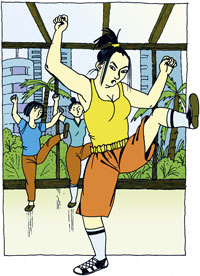KIASU: SINGAPOREAN BY ORIGIN, GLOBAL IN MEANING One of the very first words of the local vernacular that a foreigner is likely to pick up in Singapore is "kiasu". Originating from the Hokkien dialect, it may literally be translated as "afraid of losing out", "afraid of not getting the best", "always wanting the upper hand or something for free". Kiasu implies a great deal of negative qualities and rude behaviour, such as greed, egoism, acquisitiveness, rudeness, being on a constant lookout for freebies and stuffing oneself at buffet lunches. Kiasu behaviour in Singapore is manifested in everyday situations.
Kings of the Road, Lords of the Parking
Driving in Singapore has a local tinge. Before changing lanes, you naturally signal right or left, naively believing that this is a universally understood sign. Well, not in Singapore. To the driver behind you in the adjacent lane (the one you'd like to get onto), the amber twinkle of your blinker is what the red cape is to the bull: the enraged kiasuer driver charges forward, preventing you from entering his lane, his nostrils flaring and eyes glaring as he swishes by. Unable to verbally express his indignation with what to you and millions of other motorists the world over consider courteous driving as prescribed by driving manuals, the kiasu driver resorts to furious honking, too. When I shared my take on such driving habits with Singaporean friends of mine, they recommended: "Don't signal – just change lanes, otherwise kiasu drivers will never let you in."
When parking his car, the kiasu driver looks for a lot nearest to the lift or escalator. In case the first level of a multi-storey parking is packed, he will stop in between rows of parked cars, his flashlight on, his engine idling. He means to be the first to snatch the sought-after lot as soon as it is vacated. He knows that there are plenty of vacant lots on other floors – it was indicated so on an electronic board at the entrance of the carpark, but since he was here
first, he must have the benefit of parking his car on the lowest floor, no matter how long the wait might be. Last year, there was a brief promotion in Singapore: "a dollar a litre of petrol", when fuel was sold at a reduced price. It caused long lines of vehicles, contributing to traffic jams all over the island. The power of kiasuism forced many motorists to jump at the opportunity, which proved highly dubious. Since the cars had their engines on while queuing at the filling stations, the amount of fuel they wasted surpassed the profit gained. It was obvious to anyone sensible, but those who succumb to fits of kiasuism are normally not.
Kiasuism also permeates my fitness club, where there is a highly popular and thus totally overcrowded kickboxing class for women. When late for class, a foreign gal takes a spot at the back of the room, seamlessly joining others. In a similar situation, a tardy Singaporean ploughs tank-like through the group of jumping and kicking ladies, being driven by the powerful spirit of kiasuism. It dictates that she choose the best for her dear self – always, everywhere. So, she aims for the front row, which allows for an unobstructed view of both the instructor on stage and herself on the mirrored wall. The inconsiderate kiasuer claims the spot, forcing the ladies around her to move back.

Fifteen minutes before the class is over, the kiasu queen sets off to the back of the room to pick up each and every weight piled up there for the next group workout: weightlifting. Well, she knows for a fact that the instructor will later force her to share the weights with others, but kiasuism has by now taken full control of her, forcing her to ardently stack up the weights around her in circles, as if to ward off evil spirits. At times, I think I can hear her whisper: "My prec-c-c-i-o-u-s-s-s!" Does the greedy nimrod know that this poses a risk for other women in the group, who are still engulfed in kickboxing routine and may accidentally trip over her "reserves" and break their legs? I'd bet that never even crossed her mind, poisoned as it is with kiasuism.
The word kiasu is mostly known in Singapore and is a perfect illustration of Singlish, Singapore's version of the English language. The Coxford Singlish Dictionary gives an example as follows: "Look at him! So kiasu pushing people away to get a seat on the bus first!"
Manifestations of kiasuism are abundant in Singapore, and it has been labelled by the local media as a national character trait, one that is ugly and shameful. Well, the citizens of the Lion City shouldn't be so hard on themselves because though kiasuism may be of Singaporean coinage, it is hardly a "uniquely Singaporean" thing. The traits and behaviours it denotes are universal and may be found in other societies such as Russia, for example. There is even a Russian equivalent to the word kiasu – 'zhlobstvo' – which denotes a combination of both rude and greedy behaviour that permeates, lamentably, many aspects of Russian life. Kiasu behaviour is typical of human nature, regardless of nationality, and could possibly be explained by the complexity of mechanisms triggered by the self-preservation instinct.
But we must admit that Singaporeans are honest in recognising kiasuism as a social malaise, and are striving to eradicate it by means of various educational campaigns initiated by the government (about which we will tell you more in our next issue). And this is laudable and worthy of being copied.
Text Julia Sherstyuk
Illustrations Kseniya Pochtennaya
|
 +65 6696 7068
+65 6696 7068
 info@meridian103.com
info@meridian103.com
 PDA
PDA
 +65 6696 7068
+65 6696 7068
 info@meridian103.com
info@meridian103.com
 PDA
PDA

Blah, 2013-11-01